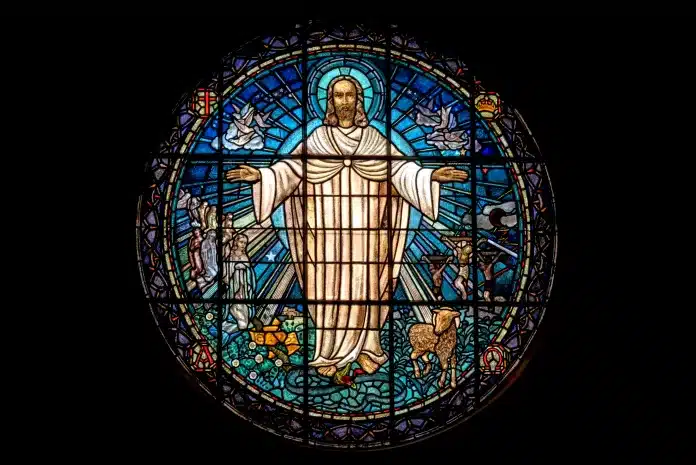The final church of this study is the Church of Laodicea – the Lukewarm church. Although I don’t go into details with the other churches as to how they relate to us now, I believe Laodicea is a great representation of the western church “system” today.
I myself was born in a 3rd world country before emigrating to America with my family. There, the government is corrupt and doesn’t have the interests of the people at heart; they only care about their pockets. In this type of situation, who else can you lean on when even your family abandons you? Only God and God alone.
I’ve seen that faith displayed in my family due to the struggles they’ve gone through and come out of and that is essentially the thing I see that’s missing here (granted many people are on fire for God so I don’t want to undermine them). For the most part, in countries such as America, most people have a moderately good life; they can feed and clothe themselves without worry, they have a job to continue paying the bills, the government isn’t corrupt (to a crazy extent) so this creates an environment of security and self-reliance.
This alone isn’t bad but I feel that as we’re walking out our faith and relationship with God, if we’re not careful we can easily slip into a state where we feel that because we can earn a living we don’t necessarily need God “as much”. This very problem is what I believe Jesus is targeting as he addresses this last letter to Laodicea.
Laodicea: The Lukewarm Church
In Revelation 3:15-16, Jesus examines the works of the Church of Laodicea and makes it clear that they are lukewarm, “I know your works, that you are neither cold nor hot. I could wish you were cold or hot. So then, because you are lukewarm, and neither cold nor hot, I will vomit you out of My mouth”. At first glance many look at this passage and believe that what’s being said here is that Laodicea is not on fire for the Lord (hot) and doing his will but at the same time they’re not worshiping other gods and wallowing in depravity (cold).
I myself thought this way until I did further research and understood the text better. In the passage Jesus makes it clear that he wishes for them to be cold or hot. In this context both cold and hot are positive things. We often see “hot” interpreted as positive and “cold” as negative, however the problem with this view is that Jesus would not wish for us to be cool in our love for him or stray away from him.
The passage implies that both cold and hot are positive attributes here while lukewarm is the only negative attribute. In an article by Craig R. Koester from Luther Seminary titled, The Message to Laodicea and the Problem of Its Local Context, Koester addresses this very issue stating,
In this passage both hot and cold have positive connotations and lukewarm has negative connotations. Since the text deals with the faith commitments of the Laodicean Christians, some have assumed that heat connotes zealous faith and that coldness indicates indifference…but it does not fit the text since it would mean that Christ wanted the congregation to be either hot- that is, more ardent in faith- or cold- that is, more firmly entrenched in unbelief. An appeal for faithfulness would make sense, but a call for unbelief would not. The metaphor requires that both hot and cold be understood positively in contrast to being lukewarm, the negative trait that characterizes the complacency of the Laodicean Christians. (409)
Laodicea’s Water Sources
The question now is what is Jesus referring to when he brings up cold, hot, or lukewarm water? One common interpretation draws on historical and geographical knowledge pertaining to the region. Ancient Laodicea had no water sources and needed to supply water to the city by way of aqueducts. About 6 miles to the north of Laodicea was Hierapolis that had healthy hot springs, and about 11 miles east was Colossae that had cold springs that were clean and refreshing to drink from.
The water had to be transported using miles of aqueducts and by the time it reached the city, it was often neither therapeutically hot nor refreshingly cold – just lukewarm. The point that many make here using the historical context is that both hot and cold water has its uses but lukewarm water is useful for nothing. In his article, Koester appeals to a different interpretation which is not as well known.
A Call to Dine with Christ
Koester believes there is a problem with the local water source interpretation due to the fact that Revelation 3 seems to allude to the fact that in this context the hot and cold water are taken into the mouth while the lukewarm water is spit out. However, from historical sources, water from Hierapolis was never noted as desirable for drinking. Another issue he points out is that Laodicea was not the only city with an aqueduct but also Ephesus, Smyrna, Pergamum, and Sardis so they would have experienced the same issue which would’ve not been unique to Laodicea alone.
Koester believes the correct context lies in the consumption of hot or cold beverages contrasted to that of a lukewarm beverage which is detestable, an imagery we see of Christ vomiting them out as a form of rejection. He gets this imagery from verse 16 mentioning Christ vomiting them out of his mouth for being lukewarm and verse 20 which can be seen as a parallel passage and encourages repentance which leads to dining with Christ.
Drawing on the imagery of a meal, the author expected readers to know that cold and hot beverages stand in contrast to their environment, and that diners find them refreshing. In contrast, the temperature of a cup of lukewarm water or wine is more like that of its surroundings; it does not distinguish itself to the touch…In previous messages the risen Christ commends works of perseverance, faith, and love (Rev 2.2, 19; 3.8) – the kind of works that would be positively regarded as cold or hot…The call for works that are cold or hot summons readers to actions that are distinguished from the familiar pattern of wealth breeding complacency, and instead express the relationship with the risen Christ that sets the Christian community apart. (415)
Despite the varying interpretations on this passage in Revelation, the point still stands that through whichever means of imagery we choose to employ, we see Jesus clearly rebuking the church of being lukewarm – a negative trait – and encourages them to be hot or cold – positive traits – for God’s glory.
Laodicea’s Pride
They believe that because they’re doing well in life, they have no use for anything else which may extend to their relationship with Christ, but Jesus makes it clear that this way of thinking is opposite to reality, “Because you say, ‘I am rich, have become wealthy, and have need of nothing’—and do not know that you are wretched, miserable, poor, blind, and naked—” (Revelation 3:17).
The last part of this speaks volumes to the true nature of the human condition, whether it’s thousands of years ago or today; without a connection to our creator, humans are constantly in search for gratification, to find that one thing that can make them whole or feel truly happy.
However, that search will always lead to disappointment if you try looking anywhere else except towards Jesus, THE connection! We may feel that we don’t need God in our lives and we’ve got it all figured out and we’re doing well on our own, but in reality we’re broken.
Christ himself offers the answer to this issue – him being the answer but that’s not said directly, “I counsel you to buy from Me gold refined in the fire, that you may be rich; and white garments, that you may be clothed, that the shame of your nakedness may not be revealed; and anoint your eyes with eye salve, that you may see,” (Revelation 3:18). He starts off by saying they should buy “gold tried in the fire, that you may be rich”.
Like we saw when examining the Church of Ephesus, this part is referencing the judgement seat of Christ where our works our tried in fire; we face loss of an eternal reward if they are burned or we gain rewards if they survive the flames (1 Corinthians 3:12-15).
As Paul wrote in 1 Corinthians 3, all our works will be tried whether they be Gold, silver, hay, or wood. Jesus tells the Laodiceans to “buy” gold tried in the fire from him meaning do works that will glorify God and expand the kingdom. Consuming your wealth with what the world has to offer doesn’t give back to Christ in anyway or aid those in need of his help.
Jesus also mentions “white raiment” a reference again to the salvation we have in Christ as well as putting off our flesh and taking on our new incorruptible forms, “In a moment, in the twinkling of an eye, at the last trumpet. For the trumpet will sound, and the dead will be raised incorruptible, and we shall be changed. For this corruptible must put on incorruption, and this mortal must put on immortality,” (1 Corinthians 15:52-53).
Grace offered to Laodicea
Although Jesus doesn’t necessarily find anything he likes in terms of behavior with the Church of Laodicea, he seems to give them more words of encouragement than any of the other churches, “As many as I love, I rebuke and chasten. Therefore be zealous and repent. Behold, I stand at the door and knock. If anyone hears My voice and opens the door, I will come in to him and dine with him, and he with Me,” (Revelation 3:19-20).
These are beautiful and hope filled words. It shows Grace at its finest. Even though this was written to this specific group of people at a specific time period, this could apply to any follower of Christ today. We may backslide and begin to rely on our own strength and knowledge and lose sight of what’s really important – our first love. Even in this, Jesus rebukes us out of love and stands ready for us to come back to him. All we need to do is open the door.
If you enjoyed this study, you can find similar studies on the book of Revelation here including the 24 Elders, the 4 living creatures, 4 Horseman, etc. I’ll end this study with the same words Christ uses at the end of each of his letters. May we continue to have ears to hear what the spirit is saying to the churches. God Bless!
To him who overcomes I will grant to sit with Me on My throne, as I also overcame and sat down with My Father on His throne. ‘He who has an ear, let him hear what the Spirit says to the churches’ (Revelation 3:21-22)
Sources
- Koester, Craig R., “The Message to Laodicea and the Problem of Its Local Context.” (2003). Faculty Publications. 9




 Support the Ministry
Support the Ministry